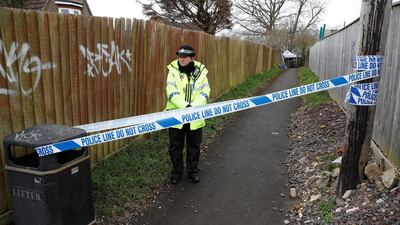It is too early to know whether the mass expulsion of more than 100 Russian officials by the United States and its allies will mark a new era in East-West relations. One thing, however, is clear: the scale of the response has taken Moscow by surprise.
Kremlin thinking about the US and its allies has for a decade been guided by the sense that the West is paralysed by indecision. Behind their obvious advantages in wealth and military power, western countries are playing a weak hand in the game of nations, for various different reasons. For the Americans it is the failure of its wars of choice in Afghanistan and Iraq, experiences which have opened the way for Russia to seize the role of primary external power in Syria. As for Britain, the old imperial lion's main concern has been ensuring the flow of Russian money to prop up London's financial sector and property market.
This was blindingly clear after the murder in 2006 of the former Russian agent Alexander Litvinenko who was poisoned with polonium in a London hotel. Despite the killers leaving a radioactive trail all the way back to Moscow, the British government delayed a full investigation into the murder for nearly a decade to avoid upsetting the Kremlin. It concluded that the murder was the work of Russian intelligence and probably approved by Vladimir Putin.
So when Sergei Skripal, a Russian double agent released from jail under a 2010 spy swap, and his daughter Yulia were poisoned with a nerve agent in the quiet English city of Salisbury, a similarly limp response was expected. Even more so as Britain looks vulnerable, having cut its defence capacity while isolating itself by withdrawing from the European Union.
Instead, Prime Minister Theresa May expelled 23 alleged Russian spy-diplomats from London and, to almost universal surprise, America and European allies followed suit. The British government has not issued any evidence to prove Russia’s guilt, saying only that there is no other reasonable explanation. This leap of faith by western allies is simply explained: every western intelligence service is exasperated by years of Russian cyber-attacks, lies and manipulation of social media, which the US ambassador to Moscow, John Huntsman, has called “a sea of disinformation”.
In the Skripal case, the false trails laid by Russian officials and media have become ever less convincing. Russia denied the existence of the nerve agent Novichok, which has been identified by Britain as the poison administered to the Skripals. When a Russian scientist spoke in an interview of working on the Novichok programme, this admission was later erased online and replaced with a statement that no such programme had ever existed.
The mass expulsions will give western countries a warm glow of satisfaction that the old bonds of solidarity still exist in an unpredictable new world.
That said, the Russians are aware of cracks in this facade of solidarity. German politicians are already questioning the fairness of retaliating against Russia without clear evidence of guilt, on the basis that past denials have proven to be false.
Expelling state employees is in any case a relic of the Cold War, when relations between East and West were restricted to a limited range of inter-state activities, unlike today. The expelled agents can be replaced in a year or two. Long-term damage to relations may be limited.
Much depends on the next steps taken by Britain. A review is inevitable of the excessively cosy relationship between the City of London and Russian businesses and wealthy individuals buying high-end properties as safe deposits in the sky. Despite Russia being under western sanctions over its annexation of Crimea, London is still the favoured location for Russian share listings and fundraising.
The British government is already taking steps to stop London being used as a money laundering capital. Britain's National Crime Agency estimates that up to $127 billion of illicit funds are laundered through the UK each year. No one knows how much of that dirty money is Russian but we might expect some figures to come out soon. As a first step, the government this month brought in Unexplained Wealth Orders, which allow investigation of people who buy properties and other assets but cannot explain the source of their riches.
Belatedly the government has promised to look again at some of the 14 unexplained deaths of Russians in Britain in recent years which the police have apparently been unwilling to investigate too thoroughly. If murder is eventually suspected in any of these unexplained cases, it is more likely to stem from the criminal/business nexus than any action on behalf of the Russian state.
Despite these actions, there will be a reluctance to push the Russians too far. Sanctions so far have driven Russia further into the arms of China, a situation which Russian officials claim to be very happy with. The prospect of a real East-West split will not serve the interests of Europe or America and in any case the Russians will not in the long-term want to isolate themselves from Europe. So any further western actions against Mr Putin and his inner circle may be moderated by geopolitical considerations.
And then there is the question: what do the Russians want? The result of the presidential election showed they were happy with a leader who takes pride in defending the country against the plots of its enemies. Today, after 64 people died in a tragic fire in a shopping mall in the Siberian coal mining city of Kemerovo, we see a nation united in grief and anger at corrupt local officials who failed to enforce safety measures.
Mr Putin’s popularity stems from his success in stabilising Russia after the chaos of the 1990s and rebuilding its military might. But he starts a new six-year term with no particular plan and at the head of a country which may want government to focus less on bombs and missiles and more on safety at home and curbing rapacious local officials.

